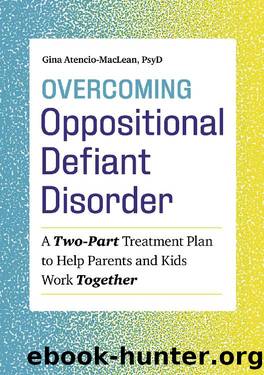Overcoming Oppositional Defiant Disorder: A Two-Part Treatment Plan to Help Parents and Kids Work Together by Gina Atencio-MacLean PsyD

Author:Gina Atencio-MacLean PsyD [PsyD, Gina Atencio-MacLean]
Language: eng
Format: epub
Publisher: Althea Press
Published: 2019-03-12T00:00:00+00:00
The following action plan will help you identify your child’s most frequent problematic behaviors and under what conditions they typically present.
First, write some of your child’s problematic behaviors in your notebook, being as specific as possible: “yelling at me when he wakes up late for school,” “throwing a tantrum when we leave the park.” Label each behavior with one of the categories discussed in chapter 5 (inflexibility, defiance of authority, and emotion regulation). Then rate each behavior on a scale of one to five, with one being the least extreme (not making the bed the first time they’re asked) and five being the most (hitting adults).
Now choose a behavior from each of the categories, making sure it doesn’t exceed a four. (Rome wasn’t built in a day.) Get specific about these three behaviors. Write down the who, what, when, where, and why. For example:
Problematic behavior: Talking back when given directives
Category: Defiance of authority
Who: Parents, teachers, and coaches
What: Speaks disrespectfully to adults, doesn’t follow directives
When: When given directives or told to do something they don’t want to do
Where: Home, school, soccer field
Why: Usually tired or anxious
Now that you’ve identified the specific contexts of these behaviors, you can more effectively target them for change, as we’ll discuss in chapters 6, 7, and 8.
Takeaways
•Children with ODD are not bad kids.
•Undeveloped or underdeveloped skills are often the cause of defiant behavior.
•These kids are doing the best they can.
•Flexibility (the ability to go with the flow, switch from one task to another, or manage feelings when things don’t go as expected) can be especially challenging for kids with ODD.
•Defiance often occurs because the child has learned over time that it’s an effective way of communicating.
•Emotional volatility, tantrums, and mood swings are ways of expressing overwhelming emotions.
•Don’t forget to take care of yourself during this process!
Download
This site does not store any files on its server. We only index and link to content provided by other sites. Please contact the content providers to delete copyright contents if any and email us, we'll remove relevant links or contents immediately.
Doing It: Let's Talk About Sex... by Hannah Witton(9275)
Thirteen Reasons Why by Jay Asher(8893)
The Girl Without a Voice by Casey Watson(7885)
The Incest Diary by Anonymous(7681)
Should I Stay or Should I Go? by Ramani Durvasula(7652)
The Lost Art of Listening by Michael P. Nichols(7494)
The Leavers by Lisa Ko(6945)
The Space Between by Michelle L. Teichman(6929)
The Testaments by Margaret Atwood(6881)
The Four Agreements by Don Miguel Ruiz(6744)
Rich Dad Poor Dad by Robert T. Kiyosaki(6612)
The Rosie Project by Graeme Simsion(6378)
Beartown by Fredrik Backman(5737)
We Need to Talk by Celeste Headlee(5608)
Ego Is the Enemy by Ryan Holiday(5414)
Men In Love by Nancy Friday(5234)
Spare by Prince Harry The Duke of Sussex(5176)
Hunger by Roxane Gay(4922)
Suicide Notes by Michael Thomas Ford(4821)
